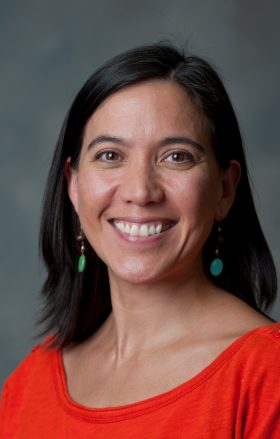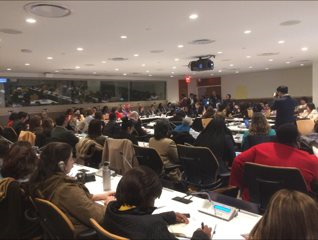Aunchalee Palmquist, assistant professor of sociology and anthropology, traveled to New York recently to present at the United Nations 61st Session on the Commission on the Status of Women.
By Sarah Collins ’18
An Elon professor recently advocated for paid parental leave and increased access to breastfeeding resources during an annual United Nations session of the Commission on the Status of Women, a two-week event for the purpose of discussing women’s rights.

Aunchalee Palmquist, an assistant professor of sociology and anthropology at Elon, spoke on March 20 at a special session titled, “Women and Labour: A Nutritional Perspective.” Addressing an audience from around the globe, Palmquist emphasized the need for global paid parental leave, as well as skilled breastfeeding support.
“This was one of the most important things I’ve ever done,” she says.
Palmquist spoke on behalf of the International Lactation Consultant Association (ILCA) and the World Alliance for Breastfeeding Action, two nongovernmental organizations recognized by the U.N. As an ILCA liaison to the U.N. and a member of the organization’s advocacy committee, she is valued for the research-based and global health perspective she brings to the table.
Currently, several barriers stand in the way of breastfeeding support, both nationally and globally. Perhaps the greatest barrier is lack of paid parental leave, Palmquist says. When new parents can’t afford to take off work following childbirth, breastfeeding may not an option, so many parents often must resort to using alternatives to ensure their child receives needed nutrition.
 Some alternatives can be detrimental to infant health, says Palmquist. “Many countries advertise formula supplements that claim to be just as healthy as breast milk,” she says. “But when these supplements are mixed with unclean water and fed in dirty bottles, it can lead to diarrhea and malnutrition or even death for the baby.”
Some alternatives can be detrimental to infant health, says Palmquist. “Many countries advertise formula supplements that claim to be just as healthy as breast milk,” she says. “But when these supplements are mixed with unclean water and fed in dirty bottles, it can lead to diarrhea and malnutrition or even death for the baby.”
Mandating paid leave for new parents, as well as establishing stronger milk-banking systems and removing the social stigmas surrounding breastfeeding, could help to remove some current barriers for parents. The U.N.’s Commission on the Status of Women serves as a platform for organizations like the ILCA to advocate for policy change and to begin establishing these resources for women.
At Elon, Palmquist brings her knowledge and expertise into the classroom. Through courses such as Food Health and Society, Medical Anthropology and Anthropology of Babies, she teaches students about the important role that breastfeeding plays in maternal and infant health. She also mentors a number of students conducting research in the field of infant and child nutrition.


